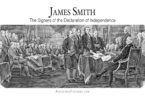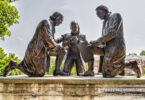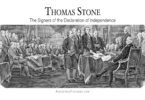Button Gwinnett is one of those lesser-known signers of the Declaration of Independence. Nonetheless, he has still established a place for himself in the history of the United States of America. While he is not well-known among the signers, Button is known to historians and history buffs, and his contributions to pre-Revolutionary America cannot be denied. This is what you need to know about Button Gwinnett.
Button was born in 1735 in England, in the village of Down Hatherley in Gloucestershire. His father was a Welsh minister, and his mother was a homemaker. The family surname comes from the Welsh county of Gwynedd. As the third of seven children born to his parents, Button had an older sister and an older brother. Most historians believe he and his older brother attended the parish school called College School in Gloucester Cathedral, which is now called The King’s School, though no surviving documentation proves this.
After attending school, Button began a career as a merchant in England, moving to the village of Wolverhampton in 1754, where he married Ann Bourne in 1757. Button and Ann moved to the British colonies in America in 1762.
Button continued his merchant career in the colonies, beginning in South Carolina, where he and his wife landed, and this work often made it necessary for him to travel. He went all along the eastern American coastline, from Newfoundland to Jamaica. When his traveling merchant career proved unsuccessful, Button moved to Savannah, Georgia, in 1765, where he opened a store. The store didn’t work for him, either, so he moved to an island called St. Catherine’s Island, located off the coast of Georgia, and made a go at being a planter. This business attempt was also not a great one for him, but he managed to make a name for himself in local politics while working at his planting business.
In 1769, Button was elected to the Provincial Assembly of Georgia.
Though his work in the Provincial Assembly was exposed to the independence movement, but he did not become a supporter of it right away. In fact, it was not until 1775 that Button embraced the idea of independence from Great Britain. This acceptance of the idea came when St. John’s Parish, where his lands were, threatened to secede from Georgia because of the colony’s muted response to some of the unwelcome acts of that time by England to some of the other colonies.
While in the Provincial Assembly, Button’s closest ally was Lyman Hall, and his primary rival was Lachlan McIntosh. The contentious relationship with McIntosh occurred after McIntosh was appointed as Brigadier General of the Georgia Continentals militia in 1776.
When Button was appointed to the Continental Congress, he voted in favor of the Declaration of Independence. When the Declaration was presented to the Continental Congress for signing, Button put his signature on it.
While in the Continental Congress, Button was put forward as a candidate for a Brigadier General position to lead the 1st Regiment of the Continental Army, but Lachlan McIntosh was chosen instead. Button was immensely embittered by losing this position to McIntosh.
After he signed the Declaration of Independence, Button headed home to Georgia, accompanied by a fellow signer, Carter Braxton, who went with him as far as Virginia. Button was bringing a proposed state constitution for Georgia with him, one written by John Adams.
Upon returning to Georgia, Button served in the Georgia state legislature. He became Speaker of the Georgia Assembly soon after and stayed in this position until the Governor of Georiga, Archibald Bulloch, died in 1777. Button was then appointed to the vacant Governor’s position by the Executive Council of the Assembly. In a position of leadership with some real power associated with it, Button looked for ways to undermine the leadership in the military of Lachlan McIntosh.
The General Assembly of Georgia voted to approve Button’s proposed assault on British Florida in April of 1777, an act which brought tensions between Button and McIntosh to an all-time high. As Acting Governor, Button was Commander-in-Chief of Georgia’s militia and was thus, now, McIntosh’s superior. To push home his point that he was the one in charge now, Button had McIntosh’s brother arrested and charged with treason. At the same time, he ordered McIntosh to lead an invasion of the Georgia military to East Florida, which was, at that time, controlled by the British. The invasion did not succeed, and Button and McIntosh both blamed each other for it. In fact, McIntosh called Button a “scoundrel and lying rascal”—in public. Those were fighting words and actions at that time.
Accordingly, to defend his honor, Button challenged McIntosh to a duel. The duel was fought on May 16, 1777. The location was a plantation owned by the deposed Royal Governor of Georgia, James Wright. Using the traditional dueling method of pistol shots at twelve paces, both men were injured. Button was the more injured of the two and died on May 19, 1777. He was buried in the Colonial Park Cemetery in Savannah. McIntosh had the last word in his rivalry with Button, surviving his wounds from the duel and going on to live until 1806. He was not charged with what happened to Button.
Gwinnett County, Georgia, which is today a suburb of Atlanta, is named after Button. Georgia Gwinnett College, also named after him, has celebrated Button Gwinnett Day since 2011.
Also, Button’s autograph is highly prized by collectors of American history memorabilia. This is because of the desire of top collectors years ago to collect signatures of all fifty-six of the signers of the Declaration of Independence and the relative scarcity of authentic Button Gwinnett signatures. In fact, there are only fifty-one known authentic examples of it because Button was a pretty obscure historical figure prior to signing the Declaration of Independence. Ten of those known signatures are in private hands, with the rest being in archives and museums.




